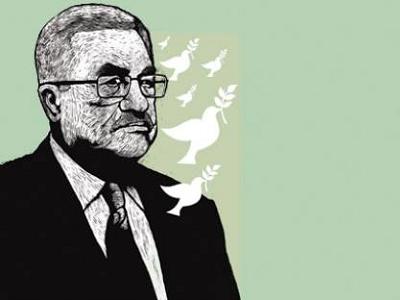Abbas’ Speech Seems to Appreciate Changing Reality

(Image Credit: Illustration: Luis Vazquez/©Gulf News)
By Ramzy Baroud – Special to Gulf News
Mamhoud Abbass’ UN General Assembly speech on September 23 is likely to go down in history. This is not owing to the intellectual enormity of Abbas himself, nor of his politically-subservient Palestinian National Authority (PNA), but rather because it reflects the triumph of the Palestinian will after nearly 20 years of useless ‘peace talks’ orchestrated by Israel, the US and their European allies.
After localising a struggle that once captured the imagination of the entire world, and then allowing it to become the sole propriety of American foreign policy agenda and Israeli diktats, Abbas, 76, is now placing his people’s grievances and aspirations back at the heart of the truly representative international community forum.
“I come before you today from the Holy Land, the land of Palestine…to speak on behalf of the Palestinian people in the homeland and in the diaspora, to say, after 63 years of suffering of the ongoing Nakba: Enough.”
It was as if the whole world, with the exception of a few countries, had anticipated the return of Palestine to its rightful place. They clapped for Abbas, cheered his every assertion, and gave him the standing ovations that the Palestinian people truly deserve.
“The time has come for my courageous and proud people, after decades of displacement and colonial occupation and ceaseless suffering, to live like other peoples of the earth, free in a sovereign and independent homeland.”
Still, the speech was not without its faults. Abbas’ willingness to return to the negotiation table without clearly highlighting how the new talks would be different to nearly 20 years of discussions that were “smashed against the rocks of the positions of the Israeli government,” according to Abbas himself, raises many doubts and questions.
Nevertheless, hearing Abbas speak was almost vindicating for those of us who had opposed his line of logic for many years. Why did it take Abbas, the PNA, and the Fatah-dominated Palestine Liberation Organisation (PLO) two decades to realise that they sought peace from a country that wished to impart none? Had there not been sufficient evidence to dissuade the Palestinian leadership from following the faulty logic of talking for the sake of talking while allowing the Israeli government to kill, rob, destroy, confiscate and besiege?
While it may be belated, Abbas has finally stated the obvious. “Colony activities embody the core of the policy of colonial military occupation of the land of the Palestinian people and all of the brutality of aggression and racial discrimination against our people that this policy entails.”
Shortly before he addressed the assembly, Abbas had officially submitted a request for full membership of a Palestinian state at the UN. The vast majority of UN members fully support the initiative, despite incessant efforts of the US to the contrary. As the US threatened to veto the statehood initiative, President Barack Obama delivered his own UN General Assembly speech. Here he warned that “there is no short cut to the end of a conflict that has endured for decades”. Several generations of Palestinians who have awaited the promise of statehood ever since the League of Nations mandate for Palestine in 1922 would strongly disagree.
Uri Avnery, the aging Israeli writer and former Knesset member, also found Obama condescending and untruthful. Obama’s speech was “a work of art. The art of hypocrisy. Almost every statement in the passage concerning the Israeli-Palestinian issue was a lie. A blatant lie: the speaker knew it was a lie, and so did the audience.”
The audience must have also known that Israeli Prime Minister Benjamin Netanyahu’s speech, delivered hours after Abbas’, was also devoid of any substantiated truth. But Netanyahu’s pomposity and disdain of the UN itself was off the chart this time. Netanyahu told delegates that he was not at the UN to win applause, but “to tell the truth”.
Truth-telling Netanyahu went on to let his audience know that when he was appointed Israel’s ambassador to the UN in 1984, a rabbi told him: “You will be serving in a house of lies.” Still, the self-aggrandising Israeli leader served his term because “even in the darkest place, the light of a candle can be seen far and wide.”
Netanyahu also insisted that he wanted peace, and peace before state, rather than after. Strangely he used Gaza as his example. According to Netanyahu, besieged, impoverished and routinely-bombarded Gaza has responded to Israel’s kind overtures of peace with war. The same war that Israel itself launched in 2008-09, killing and wounding thousands of civilians. Truth-telling, indeed.
Netanyahu’s talk seemed entirely alien to the changing reality around him, whether in the Middle East (the Arab Spring, the rise of Turkey as a contending regional power and more) or within US realm (its waning power and influence in the region in light of its economic woes, military failures and powers shifts in various Arab countries).
Abbas’ language, on the other hand, seemed to appreciate the changing reality. Considering that Abbas has played the game by US-Israeli-EU rules for too many years, often at the expense of his own people, he understands that the new era requires a new language and (hopefully) a whole new course of action.
The next weeks and months represent the litmus test for the Palestinian leadership. Will Abbas return to Ramallah merely to galvanise on his temporary popularity, but fail to alter his relationship with Israel? Will he continue to shelve the issue of Palestinian unity and the reforming of the PLO? Or, will he truly shift course, form new alliances that don’t revolve around Washington and its lobby-controlled foreign policy, reach out to his Palestinian brethren everywhere, and seek out full regional and international involvement and support for the Palestinian people?
Abbas’ next move could truly give his UN GA speech real substance, vigour and meaning, or it could merely serve as the one and only moment in his political career when he actually spoke truth to power.
– Ramzy Baroud is an internationally-syndicated columnist and the editor of PalestineChronicle.com. His latest book is My Father Was a Freedom Fighter: Gaza’s Untold Story (Pluto Press, London)










































0 Comments